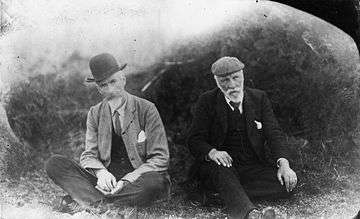Pre-Māori settlement of New Zealand theories
Since the early 1900s the theory that Polynesians (Māori) were the first ethnic group to settle in New Zealand (first proposed by Captain James Cook) has been dominant among archaeologists and anthropologists.[1][2] Before that time and until the 1920s, however, a small group of prominent anthropologists proposed that the Moriori people of the Chatham Islands represented a pre-Māori group of people from Melanesia, who once lived across all of New Zealand.[3] While this idea lost favour among academics it was widely published and incorporated into school textbooks which has extended its life in the popular imagination.[4][5][6]
Some early visitors to New Zealand did speculate that the original New Zealanders might be descended from ancient Greeks, Romans or Egyptians, and some Christian missionaries thought that the Māori ancestors belonged to the lost tribes of Israel.[7] In more recent times, outside of academia a similar variety of speculation of New Zealand's first settlers has occurred. These ideas typically incorporate aspects of conspiracy theories as they are in opposition to the last 100 years of academic research.[8][9]
Māori oral traditions
Māori oral traditions speak of spirits or fairy folk living in parts of New Zealand when they arrived. They are known by various names, but most commonly as Patupaiarehe[10] and Turehu.[11]
Early European speculation

During the 19th century, ideas about Aryan migrations became popular and these were applied to New Zealand. Edward Tregear's The Aryan Maori (1885) suggested that Aryans from India migrated to the southeast Asia and then to the islands of the Pacific, including New Zealand.[13]
The writing of Percy Smith and Elsdon Best from the late 19th century theorised about pre-Māori settlement. Their work inspired theories that the Māori had displaced a more primitive pre-Māori population of Moriori (sometimes described as a small-statured, dark-skinned race of possible Melanesian origin), in mainland New Zealand – and that the Chatham Island Moriori were the last remnant of this earlier race.[3]
Recent revivals of pre-Māori settlement theories

Although modern archaeology has largely clarified questions of the origin and dates of the earliest migrations, some conspiracy theorists have continued to speculate that what is now New Zealand was discovered by Melanesians, 'Celts', Greeks, Egyptians or the Chinese, before the arrival of the Polynesian ancestors of the Māori.[14][15] Some of these ideas have also been supported by politicians and media personalities.[6][16][17]
Martin Doutré argued in a 1999 book that New Zealand had a pre-Polynesian Celtic population, and that boulders with petroglyphs on a hill in Silverdale in Auckland are artifacts left by those people.[18] An earlier presentation of the theory of pre-Polynesian white settlement of New Zealand was Kerry Bolton's 1987 pamphlet Lords of the Soil,[19] which states that "Polynesia has been occupied by peoples of the Europoid race since ancient times".[20]
Other books presenting such theories have included The Great Divide: The Story of New Zealand & its Treaty, (2012) by Ian Wishart, a journalist, and To the Ends of the Earth by Maxwell C. Hill, Gary Cook and Noel Hilliam, which claims that New Zealand was discovered by explorers from ancient Egypt and Greece.[21]
David Rankin, a Ngāpuhi elder, has drawn attention to Māori legends suggesting that people, some of them with fair skin, were already present in the islands when Polynesians arrived, and has claimed the existence of a conspiracy among academics to suppress inquiry.[22][23]
Historians and archaeologists dismiss the theories. Michael King wrote in his history of New Zealand, "Despite a plethora of amateur theories about Melanesian, South American, Egyptian, Phoenician and Celtic colonisation of New Zealand, there is not a shred of evidence that the first human settlers were anything other than Polynesian",[24] and Richard Hill, professor of New Zealand Studies at Victoria University of Wellington, said in 2012, "Not one of [the theories] has ever passed any remote academic scrutiny."[22] Hugh Laracy of the University of Auckland called them "wild speculation" that has been "thoroughly disposed of by academic specialists".[23]
Another historian, Vincent O'Malley, and the New Zealand Archaeological Association regard the theories as having a racist or at least a political element, seeking to cast doubt on Waitangi Tribunal claims.[22][25] Scott Hamilton in "No to Nazi Pseudo-history: an Open Letter" further explains objections to the theories of Bolton and Doutré (and the website Ancient Celtic New Zealand).[26]
References
- See 1904 paper by A. Shand on The Early History of the Morioris
- Shapiro, HL (1940). "The physical anthropology of the Maori-Moriori". The Journal of the Polynesian Society. 49 (1(193)): 1–15. JSTOR 20702788.
- "Imagining Moriori: A history of ideas of a people in the twentieth century", Jacinta Blank, MA Thesis, 2007
- For example The Cyclopedia of New Zealand of 1902
- "Imagining Moriori: A history of ideas of a people in the twentieth century", Jacinta Blank, MA Thesis, 2007
- "Don Brash - Ragging on Te Reo". Radio New Zealand. 2017-12-02. Retrieved 2018-12-15.
- K. R. Howe. p 1 'Ideas of Māori origins', Te Ara: The Encyclopedia of New Zealand, updated 9 Nov 12
- "Moriori myth corrected". Stuff. Retrieved 2018-12-16.
- "TVNZ doco claiming Celts were here before Māori has been removed from OnDemand service". Stuff. Retrieved 2018-12-16.
- "Patupaiarehe-Patupaiarehe and ponaturi".
- "First peoples in Maori tradition-Patupaiarehe, Turehu and other inhabitants".
- Photograph by kind permission of the Alexander Turnbull Library, Wellington, New Zealand, reference number: 1/2-028237-F
- K. R. Howe. p 2 'Ideas of Māori origins', Te Ara: The Encyclopedia of New Zealand, updated 9 Nov 12
- Noted. "Did the Spanish or Chinese visit New Zealand before Polynesians? - The Listener". Noted. Retrieved 2019-02-02.
- "1 The Waitaha People – a Chinese colony that settled in New Zealand 2000 years ago. | The Lost Empire of Atlantis | 1421 | 1434 | Chinese Exploration | Gavin Menzies". Retrieved 2019-02-02.
- "History in the Making | NZCPR Site". www.nzcpr.com. Retrieved 2019-02-02.
- Keir, Bill (2007-01-31). "Agenda-driven history". NZ Skeptics. Retrieved 2019-02-02.
- Martin Doutré (1999). Ancient Celtic New Zealand. Auckland: Dé Danann Publishers. ISBN 9780473053673. Wayne Thompson (6 May 2009). "Call to save hilltop boulders". The New Zealand Herald.
- Kerry R. Bolton (1987). Lords of the Soil. Petone: Realist Publications. OCLC 154233606.
- Barrie Sargeant (2 December 2004). "Kerry Bolton — a nut, or just a misunderstood Mormon/Satanist/Nazi?". Fightdemback. Archived from the original on 14 April 2013. Retrieved 13 February 2013.
- The Great Divide: The Story of New Zealand and its Treaty. Auckland: Howling at the Moon. 2012. ISBN 9780987657367. Maxwell C. Hill (2012). To the Ends of the Earth. Taupiri: Ancient History Publications. ISBN 9780473206871. "Book claims European explorers were here first". 3 News. 23 March 2012.
- Rebecca Quilliam (27 December 2012). "Historians rubbish claims of academic conspiracy". The New Zealand Herald.
- "Stoush over pre-Maori colonisers theory". Stuff.co.nz, Fairfax NZ News. 28 December 2012.
- Michael King (1994). The Penguin History of New Zealand. Penguin Books. p. 29. ISBN 978-0-14-301867-4.
- "Alternative Archaeology". New Zealand Archaeological Association. Retrieved 12 February 2013.
- Scott Hamilton (18 November 2008). "No to Nazi Pseudo-history: an Open Letter". Scoop Review of Books.
Further reading
- Howe, K. (2003) The Quest for Origins - Who First Discovered and Settled New Zealand and the Pacific Islands?, Auckland: Penguin Books.